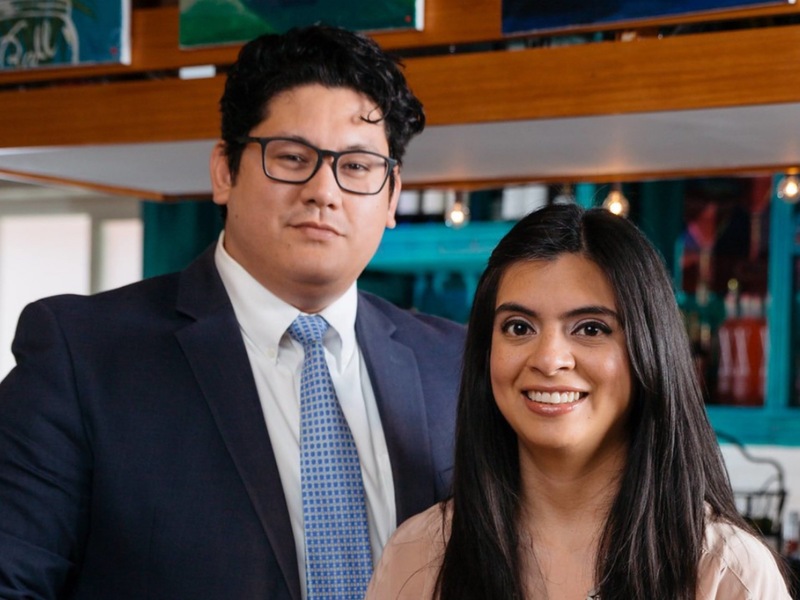Our city, with its famed summer festivals, its collegiate and pro sports teams making waves and its eclectic neighborhoods, has a side that is uncomfortable for most to discuss and realize.
Weeks ago, Brookings Institution released an analysis based on the U.S Census data from 2013-17 that shows black-white segregation continuing to rise within our city. While it is true that segregation as a whole is decreasing, which the institution credits to Hispanics moving to both predominately white and predominately black areas, the divide between black and white populations is undeniable.
This consistent segregation of communities and its subsequent effect on communities of color in Milwaukee was left out of the well-received Vogue article that made its rounds last summer. It is a beloved city with demons yet to conquer.
Despite the unfavorable reputation, Milwaukee’s community of color is in the midst of an energizing entrepreneurial boom. How has the city’s reputation of geographic and social segregation affected business owners of color in their mission to launch, grow and thrive? Local entrepreneurs of color talk about their experiences and where the future of Milwaukee is headed.
Local business owners of color who are making a difference
After Gallery is located in the artistic Riverwest area. With its new location opening in March, After Gallery will be a destination creative space at 510 E. Center St. that uses art media, events and a self-published magazine to bring the community together.
Flow Johnson carefully and skillfully curates programming to pull together a diverse group of people. There is a sentiment that businesses owned by POC aren’t walkable or safe. This fear and lack of awareness only contributes to segregated communities. Johnson says that people who are afraid are choosing to be afraid.
"If you’re ignorant, you chose to be ignorant," he said. "There is too much opportunity to inform yourself to let that dictate you living your life."
Art has historically been a medium that offers expressiveness, healing and understanding. After Gallery looks to be an affordable and inclusive artistic hub for Milwaukee and will be focused on grassroots marketing to reach other creatives of color.
Adoption Wellness, LLC is a mental health clinic that is doing its part to bridge the gap in the adoption and fostering sector where there are disproportionate amounts of children of color in comparison to the white families that are adopting and fostering for them. Jaclyn Skalnik, who has 20 years of experience as a social worker, offers support by way of connecting families to resources that help the children in cultural identity, wellness and mental health and coping with racism.
"There is this huge deficit of parents being well-intentioned, big hearts, but not really understanding their place of privilege," Skalnik said. "So, I started doing workshops and seminars in the community about race relations, perceptions and stereotypes, as it related specifically to parenting. So, while a parent who is not a parent of color can certainly love a child of color, there are some very wiggly parameters around what does that all encompass."
On her website, Skalnik says, "In adoption, we need to acknowledge the histories of the adults and children involved before we can move forward in a unified celebration. Love is a good start, but isn’t always enough."
Some local business owners are using their businesses and goods to build bridges in the community, educating their supporters and clients alike on their respective cultures, beliefs and identities. For instance, when visiting Alice’s Garden in the summer, part of the experience is in exploring the signage related to African American field hands using their agricultural, ancestral knowledge to change North American gardening and herbology.
Algo Dulce is yet another example of using one's business not only to provide, but to educate. The shop's name means "something sweet" in Spanish, which is exactly what Latinx Dominique Alvarado brings to Milwaukee in the form of artisanal Mexican delicacies. The 23-year-old Alverno student comes from a family of entrepreneurs in Mexico and has generated a following through vending at local farmer’s markets throughout the city, although she’d like to see more people of color. The city’s segregated history could nod to why there are a lack of POC not only at farmer’s markets, but other happenings throughout Milwaukee.
"Even if people of color wanted to come to those spaces, do they necessarily feel welcome or included?" she asked. Many of the business owners that I spoke to agreed that fear and stereotypes have kept segregation alive in the city.
Cuisine has been a way to bring people together and simultaneously educate them on the culture of the food they eat. Algo Dulce offers items such as arroz con leche (rice pudding), horchata (milk drink made with rice, almonds or other ingredients), churros (fried pastry) and paletas (Mexican popsicles), many of which have modified vegan options.
"Historically, people of color are seen as taboo to be vegan or vegetarian, yet, I mean, in our home countries, a lot of our diet is vegan/vegetarian. A lot of it has to do with access to meat," Alvarado explained, noting that meat, in many communities, is seen as a sign of privilege.
The Chicana owner operates with an intentional focus on highlighting her community and fellow entrepreneurs of color as well as creating a consciousness within communities of color about what we consume. Algo Dulce uses locally sourced ingredients, biodegradable cups and has put a spin on traditional, homemade Mexican treats.
Bronzeville Collective, at 339 W. North Ave., sells custom clothing, accessories and Black pop culture pieces. What began as a pop-up shop space for numerous business owners, such as Distinctive Designs/Delicious Bites by Tomira White, Papyrus and Charms by Lilo Allen, and Fly Blooms by Tiffany Miller, to showcase their goods for a limited time has morphed into an official powerhouse of POC, queer and women-owned collective businesses.
Effective social media marketing and creativity is turning the Bronzeville Collective, which is housed next to the new Black Holocaust Museum, into a neighborhood staple. It is the core of a community that is combatting the effects of a long-segregated city and a rebirth of Bronzeville Milwaukee.
The collective has become more than a place to pick up cool, handmade items. The entrepreneurs offer goods for self-care and empowerment such as healing crystals at the Papyrus and Charms Crystal Bar, as well as vision kits and gratitude jars from Fly Blooms. Even neo-soul star Erykah Badu showed love and appreciation to the Bronzeville Collective and its entrepreneurs by wearing handmade items that were delivered during her Milwaukee visit.
Business Improvement Districts are changing the face of Milwaukee
Small businesses, specifically with business owners of color, need the city and community’s support to continue creating jobs, opening doors for building and learning about other cultures, and breaking down those glass walls between us all. Milwaukee Business Improvement Districts (BIDS) and Neighborhood Improvement Districts (NIDS) prioritize small businesses to aid in the creation of jobs and opportunities within Metro Milwaukee’s most notable areas. According to the city’s website, there are over 30 BID and NID projects currently in the works of beautification initiatives and commercial development. Studies have shown that small businesses can revitalize neighborhoods, turning them into tourist destination and local hotspots while putting money back its own community.
JohnRae Stowers is the owner of JazzyRae Jewels and Accessories, a women’s clothing boutique at 4307 W. Vliet St., in the Near West Side Business Improvement District. The Martin Drive neighborhood, where the shop is located, is described as "Milwaukee’s best kept secret." Stowers says the Near West Side BIDS and its Executive Director Keith Stanley have been of great support.
"I believe they are becoming more engaged with the community and the needs of the small businesses-particularly where JazzyRae is located," she noted. "They host events so that we are aware of the available spaces in the neighborhood and provide the opportunity to network with contractors and other neighbors/business owners."
BIDS have been dedicated to growing communities highlighting the many neighborhoods that add to the identity of Milwaukee such as the Historic Third Ward, Historic King Drive and Brady Street. The extra support boost from city development helps small business dreams come to fruition and sustain success.
The Near West Side markets itself as "a great place to live, work and play," and "a neighborhood of neighborhoods, where assets are plentiful and distinct." The Near West Side promotes job opportunities, homeownership as well as encourages "pedestrian-focused amenities and "walk to work programs," that build up a community. Stowers agrees.
"They support events in an effort to engage and support businesses," she notes. "They properly engage and keep us informed via social media outlets and websites."
In exploring the beautification of a neighborhood and shopping with small businesses, especially businesses owned by POC, Milwaukee would be taking a step in the right direction. In 2019, it is disappointing to be the most segregated metro city in the country. BIDS, entrepreneurs and the city’s residents can make an impact. Here is how:
1. Shop
Buying and wearing merchandise is the ultimate form of advertisement. Love those earrings, that scarf or that sweater? Good. Take a selfie and tell people where to find it. Even better, make an outing of it. Have lunch or brunch with family or friends, then check out a couple of stores with the group. Share your experience.
2. Like/Share a page or a post
Follow them on social media. Entrepreneurs are frequently posting their products, services, sales and deals, collaborations, etc. It takes one click to share with hundreds in your network, so even if you can’t support monetarily, you can still help.
3. Encourage collaboration
You can host business meetings at a locally owned and sourced café or restaurant, or reach out to them about catering lunch. Ask work friends to do team building activities like taking a yoga class at a studio owned by a POC. Get creative and figure out how to engage and bridge gaps with new communities.
Krystal is a Milwaukee native, Marquette University alum (Go Marquette!) and has been a freelance writer for over ten years. With KDH_Creative, she continues to focus on being a multi-disciplinary creative in the areas of journalism, literature, film, marketing and public relations.
In her free time, she likes to explore the city as if she is a new transplant, to fall in love with Milwaukee all over again. She loves all things artistic such as theatrical productions, art galleries, film festivals and more. Her hobbies include playing in makeup, gardening, blogging, endlessly scrolling on Pinterest, taking romantic strolls through our public libraries and trying to learn guitar.
She's a #MamaBee of one, #MPSproud, #MontessoriAdvocate and thinks teachers are the real superheroes of the world.
Krystal is currently working on self-publishing her first book.







